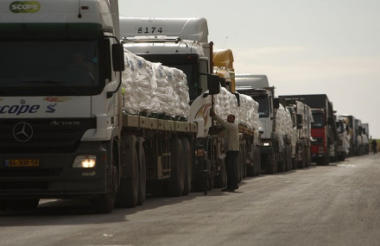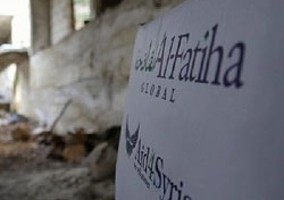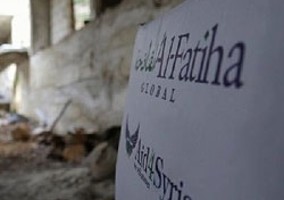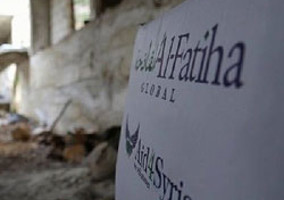The trustees of a humanitarian aid charity that was accused of supporting terrorists in Syria are responsible for misconduct and mismanagement, the charity regulator has said.
In an inquiry report into Al-Fatiha Global, the Charity Commission said it found several serious failures in administration, including failures to properly vet, safeguard and oversee volunteers who represented the charity, and to account for the way in which funds were spent.
It has taken the regulator six years to complete its inquiry.
Media allegations sparked inquiry
The Commission had been engaging with the charity since April 2013 over concerns about its participation in and organisation of an aid convoy to Syria. This activity was outside Al-Fatiha Global’s charitable purposes at the time.
The Commission inquiry was initially opened after a number of stories appeared in the media alleging inappropriate links between the charity and individuals who were claimed to be involved in supporting armed or other inappropriate activities in Syria.
In December 2013, a volunteer who was associated with the charity took part in an aid convoy to Syria. While in Syria, the volunteer was reported to have been abducted and later murdered by ISIL militants.
The Sun had run a front-page story which alleged that Adeel Ali, who it described as Al-Fatiha's chief executive but who the charity said was a volunteer, was in Syria supporting rebel fighters
The regulator’s inquiry was launched in March 2014.
At the time the inquiry was opened, the police were investigating the allegations set out in the newspaper report. They later confirmed they were taking no further action.
The regulator appointed Michael King from the law firm Stone King as the interim manager in 2015. King had responsibility for running the charity in place of trustees. The Commission discharged King in 2016.
On 22 December 2016, the Commission sent a letter informing the trustees of the charity that “we have today concluded the substantive investigatory phase of our statutory inquiry into the activities of Al-Fatiha Global”. It added that it would be sending a copy of the draft report prior to publication.
Six-year inquiry duration 'caused problems'
The Commission published the report this week, and the charity has said that the long duration of the inquiry caused it problems.
A spokesperson said: “A direct consequence of the Commission’s refusal to publish the report meant that one-by-one, financial institutions withdrew payment processing facilities. Payment gateways couldn’t understand why the Commission was refusing to publish its report and considered Al-Fatiha Global extremely high risk.
“The Commission has a dual role with respect to charities, offering support to those who are sincere in trying to make a difference, and investigating and prosecuting individuals who abuse charity structures.
“In Al-Fatiha Global’s case, the trustees wholeheartedly welcomed the appointment of the interim manager and saw this as an opportunity to improve the work done by the charity.”
The spokesperson added that “the Commission realised that the trustees (both original and those appointed by the interim manager) were sincere in trying to make a difference in the world, and all the negative media reports were unrepresentative of how the charity was run.” But they said: “Those investigating on behalf of the Commission seemed to be unaware they also have a statutory duty to support charities.
“The actions of the Commission has left the charity sector poorer and has damaged the reputation of the Commission in the eyes of many.”
A Charity Commission spokesperson said: “We acknowledge that it has taken longer than we hoped, and the charity expected, to bring this inquiry to a conclusion. We always aim to conclude inquiries as quickly as possible, as we consider it in the public interest that we are able to make determinations on concerns and allegations in a timely way.
“Unfortunately, resource pressures, and the involvement of third parties, can mean that some inquiries take considerably longer than others.”
The spokesperson added that it was not accurate to suggest the regulator refused to publish a report, and emphasised that an inquiry is not formally concluded until the publication of a report.
Findings
The inquiry report states that the charity’s trustees provided “little to no” oversight of individuals to whom they had delegated responsibility, including those that managed participation in convoys to Syria.
It found that the trustees did not act reasonably to ensure the charity’s assets, including its name, were used only to support or carry out its purposes.
The Commission found that individuals travelled overseas carrying between £2,000-£3,000 each, but that there were “insufficient records” as to how cash or aid were applied in Syria.
‘They put their charity – its people, assets and good name – at serious risk’
Amy Spiller, head of investigation teams at the Commission, said: “Charity represents the best of human characteristics – that’s why the behaviour of charities, and those involved in charities, matters. This is especially the case where charities work to help the most vulnerable or work in areas of inherent risk for staff and volunteers.
“Sadly, we found that the trustees of Al-Fatiha Global failed in their legal duties and responsibilities. They put their charity – its people, assets and good name – at serious risk. I am pleased that the charity is now on a much more secure footing, with a largely new trustee board, and appropriate policies and processes in place to ensure the charity delivers on its purpose safely.
“I hope other trustees learn from this case – notably about the very serious risks involved in taking part in aid convoys.”
Related articles
Charity Commission discharges Al-Fatiha Global’s interim manager
An aid charity accused of supporting terrorists in Syria has been given a "clean bill of health" by an interim manager appointed last year by the Charity Commission - but the regulator says its inquiry is ongoing.
Interim manager appointed at charity linked to Syrian fighter
The Charity Commission has appointed an interim manager at an aid charity that was accused by The Sun of supporting Muslim fighters in Syria, as part of an ongoing investigation.
Charity Commission investigates aid charity over alleged Syrian fighter links
The Charity Commission has opened a statutory inquiry into an Islamic humanitarian aid charity following allegations that some within it have been involved in supporting fighters in Syria.











